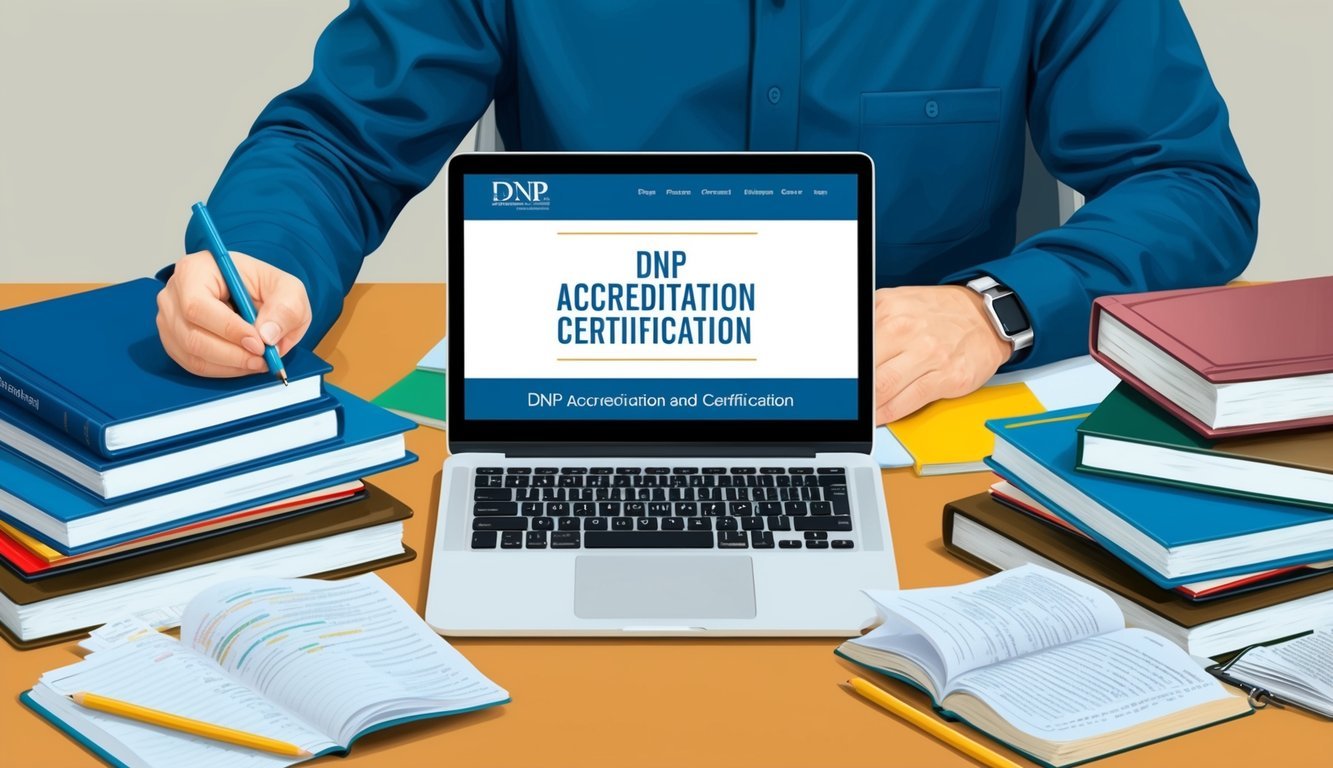The Doctor of Nursing Practice, or DNP, is a key credential for nurses looking to advance their careers and enhance patient care.
To become a DNP, you need to complete a nursing degree, obtain a registered nursing license, and pursue a DNP program that fits your career goals.
This pathway prepares you for leadership roles and provides the skills necessary to influence healthcare practices.
Many choose the DNP route to become nurse practitioners or to hold leadership positions in healthcare settings.
With a focus on evidence-based practice, DNP programs equip you with the competencies needed to implement improvements in patient care and nursing practice.
As healthcare continues to evolve, a DNP degree can position you as a vital part of advancing nursing excellence.
Understanding the different educational pathways and opportunities available can help you make an informed choice.
Whether you’re interested in a clinical role or a leadership position, pursuing a DNP can open doors for a rewarding and impactful career in nursing.
Key Takeaways
- A DNP degree enhances your role in advanced nursing practice.
- Completing a nursing degree and obtaining a license are essential steps.
- Pursuing a DNP can lead to leadership opportunities in healthcare.
Understanding the DNP Degree
The Doctor of Nursing Practice (DNP) is a key educational pathway for nurses aiming to achieve a high level of clinical expertise.
This degree focuses on advanced nursing practice, leadership, and the application of research in healthcare settings.
Below is a closer look at how this degree has evolved, its distinction from a PhD in nursing, and its significance in the healthcare field.
Evolution of the DNP
The DNP emerged in response to the growing need for advanced clinical skills and leadership in nursing.
Developed in the late 1990s, it was designed to enhance patient care through evidence-based practice.
Initially, many nurses earned a Master of Science in Nursing (MSN) and entered practice.
With changes in healthcare demands, the DNP became necessary as a terminal degree in nursing.
It reflects a shift towards doctoral education focused on clinical practice rather than just research.
Programs now emphasize the Essentials of Doctoral Education for Advanced Nursing Practice.
This framework supports the integration of clinical expertise and leadership skills.
DNP vs. PhD in Nursing
When considering doctoral education, it’s vital to understand the difference between a DNP and a PhD in Nursing.
| DNP | PhD in Nursing |
|---|---|
| Focuses on clinical practice | Focuses on nursing research |
| Prepares for leadership roles | Prepares for academic or research-focused careers |
| Emphasizes patient care | Emphasizes theory and research |
The DNP is often labeled a non-research clinical doctorate, catering to those who wish to improve patient outcomes directly.
In contrast, the PhD aims to advance nursing knowledge through research and academia.
Importance in Healthcare
The DNP plays a vital role in today’s healthcare system.
As you work in clinical settings, you’ll apply research findings to improve patient care.
DNP holders are trained in leadership and quality improvement, equipping them to address complex healthcare challenges.
They are instrumental in developing policies and implementing changes that enhance healthcare delivery.
With the increasing complexity of patient needs, having leaders educated at the DNP level is essential.
They bridge the gap between research and practice, ensuring that patient care is both effective and evidence-based.
Educational Pathways
Choosing the right educational pathway is crucial for becoming a Doctor of Nursing Practice (DNP).
You can pursue different routes depending on your current education and career goals.
Here are the main options available.
BSN to DNP Routes
If you hold a Bachelor of Science in Nursing (BSN), you can enter a BSN to DNP program.
These programs combine master’s and doctoral-level education.
They usually take about 3 to 4 years to complete.
While in these programs, you’ll gain advanced skills in clinical practice and leadership.
Many institutions offer streamlined courses that cover essential nursing principles and topics.
Admission typically requires a valid nursing license and a minimum GPA.
Courses often include advanced disease management, evidence-based practice, and healthcare policy.
Explore a variety of BSN to DNP programs at institutions like AACN to find one that fits your needs.
MSN to DNP Advancement
For those with a Master of Science in Nursing (MSN), pursuing a DNP degree is a logical step.
MSN to DNP programs are designed to enhance your skills further and focus more on leadership and practice improvements.
These programs generally take 1 to 2 years to complete.
Core subjects may include healthcare systems, statistics, and advanced clinical practice.
Some programs offer a capstone project that allows you to apply your skills in a practical setting.
Completing this program prepares you for higher-level positions in various healthcare settings.
Check out available options at Nurse.org to find suitable MSN to DNP programs tailored to your goals.
Online DNP Programs Options
Online DNP programs provide great flexibility for working nurses.
Many schools offer fully online options, allowing you to balance work and your education.
These programs cover similar content to traditional DNP programs, including leadership skills and clinical expertise.
You can generally complete the coursework on your schedule, but expect some live classes or online discussions.
Look for accredited programs to ensure you receive a quality education.
Institutions offering online DNP programs can be explored at NurseJournal.
DNP Curriculum and Competencies
The Doctor of Nursing Practice (DNP) program includes a comprehensive curriculum that prepares you for advanced nursing roles.
You’ll engage in core courses, specialization areas, and clinical experiences.
Each aspect is designed to enhance your competencies and promote evidence-based practice.
Core Courses
Core courses in a DNP program focus on essential nursing competencies.
Key subjects typically include:
- Advanced Nursing Practice: Understanding frameworks and approaches in advanced nursing roles.
- Healthcare Policy: Examining policies that impact nursing and patient care.
- Informatics: Learning to use data effectively for improving patient outcomes.
These courses aim to develop your skills in quality improvement and evidence-based practice.
A clear grasp of these topics ensures that you are prepared to make informed decisions in clinical settings.
Specialization and Electives
Within the DNP curriculum, you can choose specialization tracks that align with your career goals.
Options might include:
- Nurse Anesthesia
- Nursing Leadership
- Clinical Nurse Specialist
Elective courses allow you to focus on niche areas, such as mental health or pediatrics.
This part of the curriculum supports your passion and strengthens your ability to address specific patient needs.
Clinical Experience Requirements
Clinical experience is a crucial component of the DNP program.
You are required to complete a significant number of clinical hours as part of your training.
- Direct Patient Care: Engaging with patients to apply theoretical knowledge.
- Quality Improvement Projects: Implementing changes to improve care quality and outcomes.
- Leadership Roles: Taking charge in clinical settings to foster teamwork and innovation.
This hands-on training solidifies your readiness for advanced practice.
You’ll enhance your clinical skills while ensuring that your practice is rooted in current evidence and best practices.
This emphasis on clinical training underlines the importance of preparing for real-world challenges in healthcare.
Career Opportunities and Outcomes
Earning a Doctor of Nursing Practice (DNP) opens the door to many rewarding career paths.
This degree not only enhances your clinical skills but also prepares you for leadership roles in various nursing areas.
Below are key opportunities available to DNP graduates.
Advanced Practice Roles
As a DNP graduate, you can pursue advanced practice roles such as Nurse Practitioner (NP), Clinical Nurse Specialist (CNS), Nurse Anesthetist (CRNA), and Nurse Midwife (CNM).
These roles allow you to deliver high-level care and improve patient outcomes.
| Role | Average Salary (2023) |
|---|---|
| Nurse Practitioner | $129,480 |
| Clinical Nurse Specialist | $120,000 |
| Nurse Anesthetist | $189,000 |
| Nurse Midwife | $112,000 |
These professionals often work independently or in collaboration with physicians, taking on responsibilities that traditionally belong to doctors.
Leadership and Administration
DNP holders are well-prepared for leadership and administrative positions in healthcare settings.
Roles such as Chief Nursing Officer (CNO) and Nurse Executive are critical in influencing healthcare policies and improving organizational performance.
In these positions, you will be responsible for strategic planning, managing budgets, and leading nursing teams.
The skills gained through a DNP program enhance your ability to drive change and improve healthcare delivery systems.
Nursing Education and Academia
If you have a passion for teaching, a DNP can lead you to a position as a Nurse Educator or faculty member in academic settings.
Nurse educators are vital for training the next generation of nurses, addressing the current talent drain in the nursing workforce.
In this role, you’ll create curricula, teach clinical skills, and mentor aspiring nurses.
There is a high demand for qualified nursing educators in universities and clinical training programs, making this a promising career path.
Accreditation and Certification

Accreditation and certification are crucial steps in your journey to becoming a Doctor of Nursing Practice (DNP).
They ensure that your education meets high standards and that you are qualified to practice effectively in the field.
Understanding these processes will help you navigate your professional path with confidence.
Accrediting Bodies
Accrediting bodies evaluate and ensure the quality of nursing programs.
The Commission on Collegiate Nursing Education (CCNE) is a well-recognized agency responsible for accrediting DNP programs.
Accreditation from the CCNE ensures that the educational program meets specific standards required for advanced practice nursing.
You should look for programs accredited by trusted organizations like the AACN.
Programs with this accreditation provide a solid foundation for your future nursing practice.
Attending an accredited program can also be important for obtaining financial aid and for future employment opportunities.
Licensure and Certification
After you complete your DNP program, you must achieve licensure and national certification.
To become an Advanced Practice Registered Nurse (APRN), you’ll need to pass a national certification exam relevant to your area of specialty.
Each state has its own licensure requirements, so make sure to check with your state’s nursing board.
This may include submitting proof of your degree, passing the licensing exam, and completing any required background checks.
Certification is generally specific to your practice area, whether you focus on nurse practitioner roles or other specialties.
Maintaining your certification requires ongoing education and adherence to ethical standards.
Continuous Professional Development
Continuous professional development is vital for maintaining your skills and knowledge as a DNP.
Many states require ongoing education to keep your license active.
This could include attending workshops, completing online courses, or participating in professional nursing organizations.
Find organizations such as the American Association of Colleges of Nursing (AACN) that offer resources for your professional growth.
Staying informed about advancements in nursing and healthcare can enhance your practice and improve patient care.
Engaging in lifelong learning not only meets licensure requirements but also prepares you for leadership roles in nursing.
This commitment to development reflects your dedication to your profession and your patients.
Frequently Asked Questions

When considering a Doctor of Nursing Practice (DNP) degree, you may have specific questions about the educational path, program duration, and career opportunities.
Understanding these details can help you prepare for this advanced nursing role.
What are the educational requirements to become a Doctor of Nursing Practice?
To pursue a DNP, you typically need to hold a Bachelor of Science in Nursing (BSN) or a Master of Science in Nursing (MSN) degree.
Some programs may also accept other health-related degrees, but they usually require you to have an active registered nurse (RN) license.
What is the typical duration to complete a Doctor of Nursing Practice program?
The time it takes to complete a DNP program varies.
For those with an MSN, programs usually last about 1-2 years.
If you start with a BSN, expect 3-5 years of study.
The choice of full-time or part-time enrollment will also affect duration.
Can one achieve a Doctor of Nursing Practice degree through online programs?
Yes, many universities offer online DNP programs.
These programs provide flexibility for working nurses.
Online courses often incorporate clinical practice and project components to ensure hands-on experience.
Check specific universities to find the right program for you.
What steps must a Bachelor of Science in Nursing graduate take to obtain a Doctor of Nursing Practice?
If you have a BSN, follow these steps:
- Research Programs: Look for accredited DNP programs.
- Prepare Application Materials: Gather transcripts, letters of recommendation, and your personal statement.
- Complete Prerequisites: Ensure you meet any specific course or experience requirements.
- Apply: Submit your application before the deadline.
- Enroll and Complete the Program: Follow the course requirements and clinical hours.
Are individuals with a Doctor of Nursing Practice entitled to use the title ‘Doctor’?
Yes, DNP graduates can use the title “Doctor” as they hold a doctoral degree.
However, it’s important to clarify your role, especially in healthcare settings, to differentiate from medical doctors (MDs).
What are the projected employment prospects for Doctor of Nursing Practice graduates?
DNP graduates have strong employment prospects.
Healthcare continues to evolve, and nurses with a DNP are increasingly needed in leadership and specialized roles.
Advanced practice registered nurses (APRNs) often earn higher salaries and have more responsibilities than their RN counterparts.
Recent data shows that the average salary for APRNs is around $129,480.
For more detailed insights, you can refer to these resources here, here, and here.

